NUR312 Assessment Task 2: Reflection on a Life Crisis Case Study
VerifiedAdded on 2022/11/25
|7
|3363
|372
Report
AI Summary
This report details a student's reflection on a nursing life crisis encountered during a palliative care internship. The case study involves Mrs. Brown, an Indigenous Australian patient, who experienced complications and inadequate care, leading to breaches of equity and patient rights. The student uses Kanel's four components of crisis to outline the event, describing the patient's physical and emotional distress, the impact of negligence, and adverse drug reactions. The reflection analyzes the outcomes, highlighting cultural insensitivity and the violation of social justice principles, particularly regarding equity and diversity. The student then revises their approach to patient care, emphasizing cultural awareness, therapeutic relationships, and adherence to NMBA practice standards. The report concludes by confirming how the revised approach aligns with professional guidelines, promoting patient-centered care and advocating for improved healthcare practices.
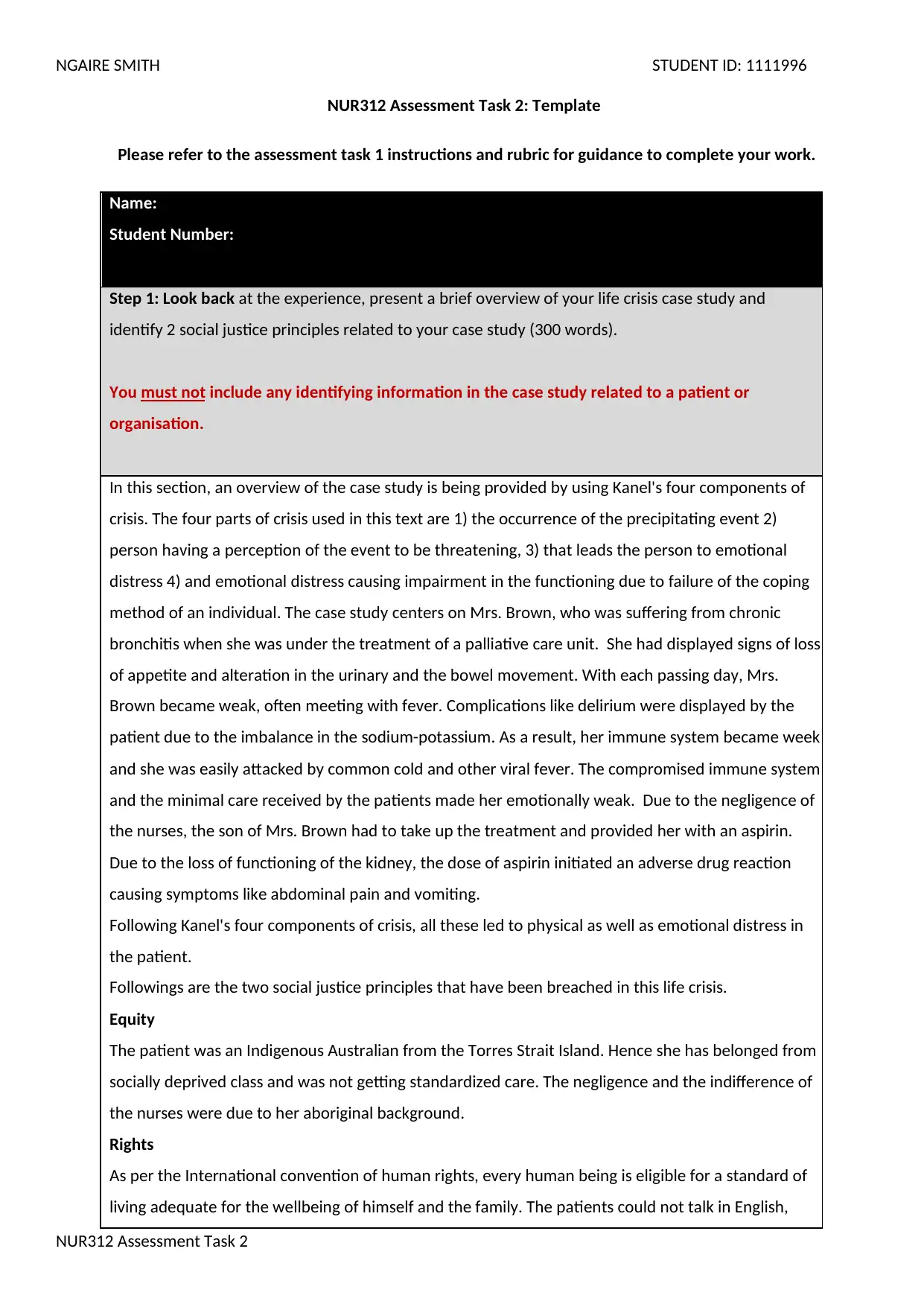
NGAIRE SMITH STUDENT ID: 1111996
NUR312 Assessment Task 2
NUR312 Assessment Task 2: Template
Please refer to the assessment task 1 instructions and rubric for guidance to complete your work.
Name:
Student Number:
Step 1: Look back at the experience, present a brief overview of your life crisis case study and
identify 2 social justice principles related to your case study (300 words).
You must not include any identifying information in the case study related to a patient or
organisation.
In this section, an overview of the case study is being provided by using Kanel's four components of
crisis. The four parts of crisis used in this text are 1) the occurrence of the precipitating event 2)
person having a perception of the event to be threatening, 3) that leads the person to emotional
distress 4) and emotional distress causing impairment in the functioning due to failure of the coping
method of an individual. The case study centers on Mrs. Brown, who was suffering from chronic
bronchitis when she was under the treatment of a palliative care unit. She had displayed signs of loss
of appetite and alteration in the urinary and the bowel movement. With each passing day, Mrs.
Brown became weak, often meeting with fever. Complications like delirium were displayed by the
patient due to the imbalance in the sodium-potassium. As a result, her immune system became week
and she was easily attacked by common cold and other viral fever. The compromised immune system
and the minimal care received by the patients made her emotionally weak. Due to the negligence of
the nurses, the son of Mrs. Brown had to take up the treatment and provided her with an aspirin.
Due to the loss of functioning of the kidney, the dose of aspirin initiated an adverse drug reaction
causing symptoms like abdominal pain and vomiting.
Following Kanel's four components of crisis, all these led to physical as well as emotional distress in
the patient.
Followings are the two social justice principles that have been breached in this life crisis.
Equity
The patient was an Indigenous Australian from the Torres Strait Island. Hence she has belonged from
socially deprived class and was not getting standardized care. The negligence and the indifference of
the nurses were due to her aboriginal background.
Rights
As per the International convention of human rights, every human being is eligible for a standard of
living adequate for the wellbeing of himself and the family. The patients could not talk in English,
NUR312 Assessment Task 2
NUR312 Assessment Task 2: Template
Please refer to the assessment task 1 instructions and rubric for guidance to complete your work.
Name:
Student Number:
Step 1: Look back at the experience, present a brief overview of your life crisis case study and
identify 2 social justice principles related to your case study (300 words).
You must not include any identifying information in the case study related to a patient or
organisation.
In this section, an overview of the case study is being provided by using Kanel's four components of
crisis. The four parts of crisis used in this text are 1) the occurrence of the precipitating event 2)
person having a perception of the event to be threatening, 3) that leads the person to emotional
distress 4) and emotional distress causing impairment in the functioning due to failure of the coping
method of an individual. The case study centers on Mrs. Brown, who was suffering from chronic
bronchitis when she was under the treatment of a palliative care unit. She had displayed signs of loss
of appetite and alteration in the urinary and the bowel movement. With each passing day, Mrs.
Brown became weak, often meeting with fever. Complications like delirium were displayed by the
patient due to the imbalance in the sodium-potassium. As a result, her immune system became week
and she was easily attacked by common cold and other viral fever. The compromised immune system
and the minimal care received by the patients made her emotionally weak. Due to the negligence of
the nurses, the son of Mrs. Brown had to take up the treatment and provided her with an aspirin.
Due to the loss of functioning of the kidney, the dose of aspirin initiated an adverse drug reaction
causing symptoms like abdominal pain and vomiting.
Following Kanel's four components of crisis, all these led to physical as well as emotional distress in
the patient.
Followings are the two social justice principles that have been breached in this life crisis.
Equity
The patient was an Indigenous Australian from the Torres Strait Island. Hence she has belonged from
socially deprived class and was not getting standardized care. The negligence and the indifference of
the nurses were due to her aboriginal background.
Rights
As per the International convention of human rights, every human being is eligible for a standard of
living adequate for the wellbeing of himself and the family. The patients could not talk in English,
Paraphrase This Document
Need a fresh take? Get an instant paraphrase of this document with our AI Paraphraser
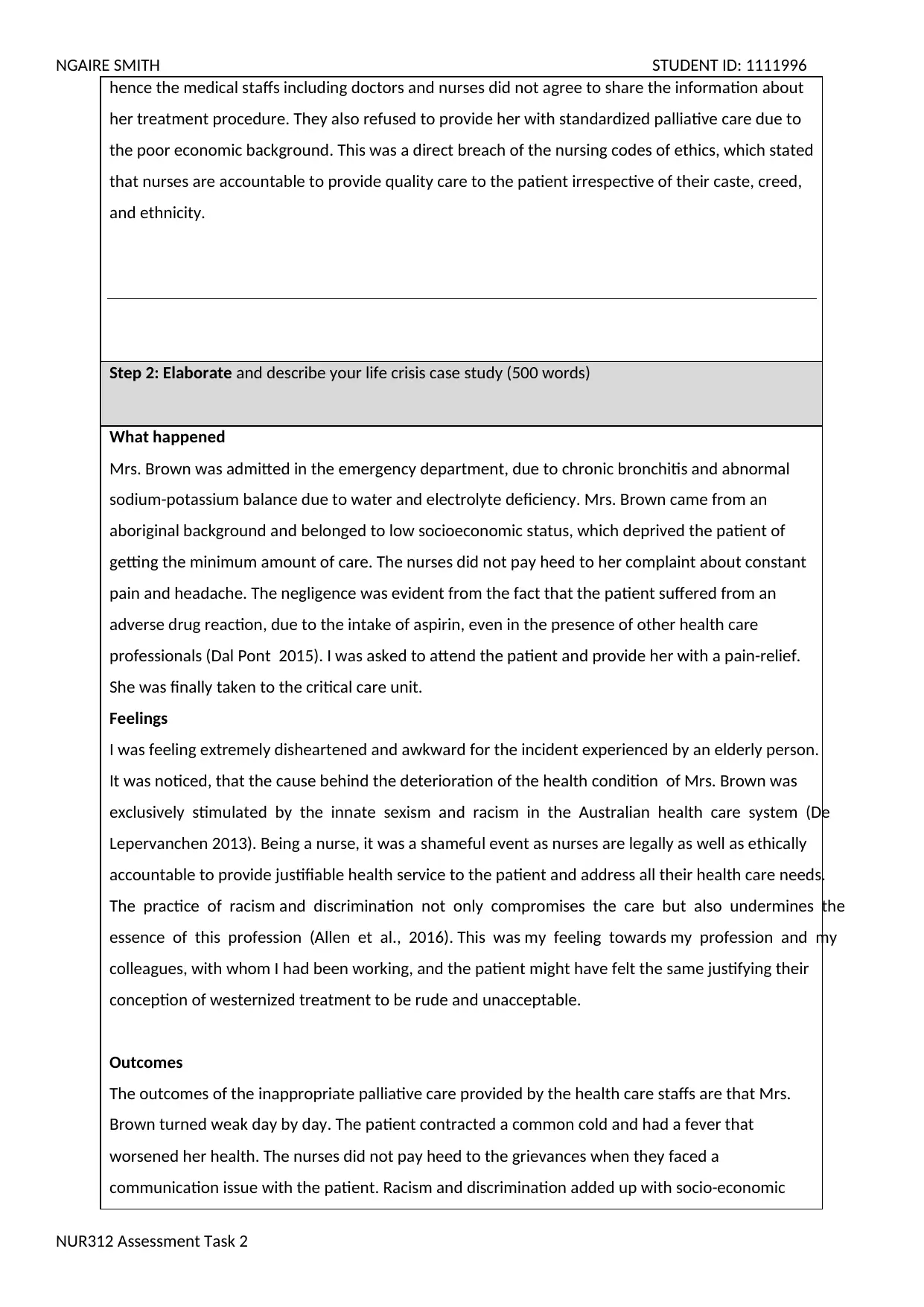
NGAIRE SMITH STUDENT ID: 1111996
NUR312 Assessment Task 2
hence the medical staffs including doctors and nurses did not agree to share the information about
her treatment procedure. They also refused to provide her with standardized palliative care due to
the poor economic background. This was a direct breach of the nursing codes of ethics, which stated
that nurses are accountable to provide quality care to the patient irrespective of their caste, creed,
and ethnicity.
Step 2: Elaborate and describe your life crisis case study (500 words)
What happened
Mrs. Brown was admitted in the emergency department, due to chronic bronchitis and abnormal
sodium-potassium balance due to water and electrolyte deficiency. Mrs. Brown came from an
aboriginal background and belonged to low socioeconomic status, which deprived the patient of
getting the minimum amount of care. The nurses did not pay heed to her complaint about constant
pain and headache. The negligence was evident from the fact that the patient suffered from an
adverse drug reaction, due to the intake of aspirin, even in the presence of other health care
professionals (Dal Pont 2015). I was asked to attend the patient and provide her with a pain-relief.
She was finally taken to the critical care unit.
Feelings
I was feeling extremely disheartened and awkward for the incident experienced by an elderly person.
It was noticed, that the cause behind the deterioration of the health condition of Mrs. Brown was
exclusively stimulated by the innate sexism and racism in the Australian health care system (De
Lepervanchen 2013). Being a nurse, it was a shameful event as nurses are legally as well as ethically
accountable to provide justifiable health service to the patient and address all their health care needs.
The practice of racism and discrimination not only compromises the care but also undermines the
essence of this profession (Allen et al., 2016). This was my feeling towards my profession and my
colleagues, with whom I had been working, and the patient might have felt the same justifying their
conception of westernized treatment to be rude and unacceptable.
Outcomes
The outcomes of the inappropriate palliative care provided by the health care staffs are that Mrs.
Brown turned weak day by day. The patient contracted a common cold and had a fever that
worsened her health. The nurses did not pay heed to the grievances when they faced a
communication issue with the patient. Racism and discrimination added up with socio-economic
NUR312 Assessment Task 2
hence the medical staffs including doctors and nurses did not agree to share the information about
her treatment procedure. They also refused to provide her with standardized palliative care due to
the poor economic background. This was a direct breach of the nursing codes of ethics, which stated
that nurses are accountable to provide quality care to the patient irrespective of their caste, creed,
and ethnicity.
Step 2: Elaborate and describe your life crisis case study (500 words)
What happened
Mrs. Brown was admitted in the emergency department, due to chronic bronchitis and abnormal
sodium-potassium balance due to water and electrolyte deficiency. Mrs. Brown came from an
aboriginal background and belonged to low socioeconomic status, which deprived the patient of
getting the minimum amount of care. The nurses did not pay heed to her complaint about constant
pain and headache. The negligence was evident from the fact that the patient suffered from an
adverse drug reaction, due to the intake of aspirin, even in the presence of other health care
professionals (Dal Pont 2015). I was asked to attend the patient and provide her with a pain-relief.
She was finally taken to the critical care unit.
Feelings
I was feeling extremely disheartened and awkward for the incident experienced by an elderly person.
It was noticed, that the cause behind the deterioration of the health condition of Mrs. Brown was
exclusively stimulated by the innate sexism and racism in the Australian health care system (De
Lepervanchen 2013). Being a nurse, it was a shameful event as nurses are legally as well as ethically
accountable to provide justifiable health service to the patient and address all their health care needs.
The practice of racism and discrimination not only compromises the care but also undermines the
essence of this profession (Allen et al., 2016). This was my feeling towards my profession and my
colleagues, with whom I had been working, and the patient might have felt the same justifying their
conception of westernized treatment to be rude and unacceptable.
Outcomes
The outcomes of the inappropriate palliative care provided by the health care staffs are that Mrs.
Brown turned weak day by day. The patient contracted a common cold and had a fever that
worsened her health. The nurses did not pay heed to the grievances when they faced a
communication issue with the patient. Racism and discrimination added up with socio-economic
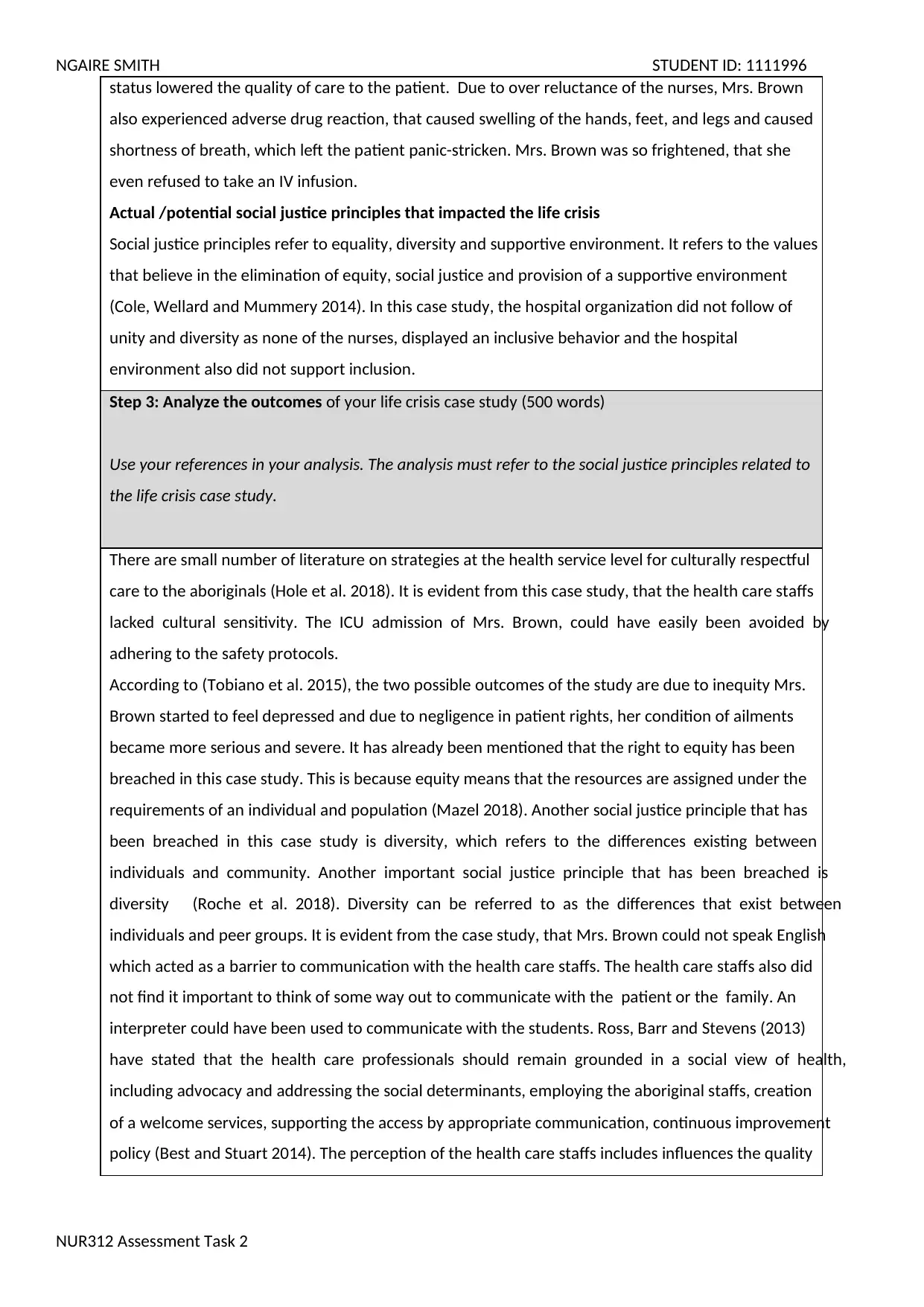
NGAIRE SMITH STUDENT ID: 1111996
NUR312 Assessment Task 2
status lowered the quality of care to the patient. Due to over reluctance of the nurses, Mrs. Brown
also experienced adverse drug reaction, that caused swelling of the hands, feet, and legs and caused
shortness of breath, which left the patient panic-stricken. Mrs. Brown was so frightened, that she
even refused to take an IV infusion.
Actual /potential social justice principles that impacted the life crisis
Social justice principles refer to equality, diversity and supportive environment. It refers to the values
that believe in the elimination of equity, social justice and provision of a supportive environment
(Cole, Wellard and Mummery 2014). In this case study, the hospital organization did not follow of
unity and diversity as none of the nurses, displayed an inclusive behavior and the hospital
environment also did not support inclusion.
Step 3: Analyze the outcomes of your life crisis case study (500 words)
Use your references in your analysis. The analysis must refer to the social justice principles related to
the life crisis case study.
There are small number of literature on strategies at the health service level for culturally respectful
care to the aboriginals (Hole et al. 2018). It is evident from this case study, that the health care staffs
lacked cultural sensitivity. The ICU admission of Mrs. Brown, could have easily been avoided by
adhering to the safety protocols.
According to (Tobiano et al. 2015), the two possible outcomes of the study are due to inequity Mrs.
Brown started to feel depressed and due to negligence in patient rights, her condition of ailments
became more serious and severe. It has already been mentioned that the right to equity has been
breached in this case study. This is because equity means that the resources are assigned under the
requirements of an individual and population (Mazel 2018). Another social justice principle that has
been breached in this case study is diversity, which refers to the differences existing between
individuals and community. Another important social justice principle that has been breached is
diversity (Roche et al. 2018). Diversity can be referred to as the differences that exist between
individuals and peer groups. It is evident from the case study, that Mrs. Brown could not speak English
which acted as a barrier to communication with the health care staffs. The health care staffs also did
not find it important to think of some way out to communicate with the patient or the family. An
interpreter could have been used to communicate with the students. Ross, Barr and Stevens (2013)
have stated that the health care professionals should remain grounded in a social view of health,
including advocacy and addressing the social determinants, employing the aboriginal staffs, creation
of a welcome services, supporting the access by appropriate communication, continuous improvement
policy (Best and Stuart 2014). The perception of the health care staffs includes influences the quality
NUR312 Assessment Task 2
status lowered the quality of care to the patient. Due to over reluctance of the nurses, Mrs. Brown
also experienced adverse drug reaction, that caused swelling of the hands, feet, and legs and caused
shortness of breath, which left the patient panic-stricken. Mrs. Brown was so frightened, that she
even refused to take an IV infusion.
Actual /potential social justice principles that impacted the life crisis
Social justice principles refer to equality, diversity and supportive environment. It refers to the values
that believe in the elimination of equity, social justice and provision of a supportive environment
(Cole, Wellard and Mummery 2014). In this case study, the hospital organization did not follow of
unity and diversity as none of the nurses, displayed an inclusive behavior and the hospital
environment also did not support inclusion.
Step 3: Analyze the outcomes of your life crisis case study (500 words)
Use your references in your analysis. The analysis must refer to the social justice principles related to
the life crisis case study.
There are small number of literature on strategies at the health service level for culturally respectful
care to the aboriginals (Hole et al. 2018). It is evident from this case study, that the health care staffs
lacked cultural sensitivity. The ICU admission of Mrs. Brown, could have easily been avoided by
adhering to the safety protocols.
According to (Tobiano et al. 2015), the two possible outcomes of the study are due to inequity Mrs.
Brown started to feel depressed and due to negligence in patient rights, her condition of ailments
became more serious and severe. It has already been mentioned that the right to equity has been
breached in this case study. This is because equity means that the resources are assigned under the
requirements of an individual and population (Mazel 2018). Another social justice principle that has
been breached in this case study is diversity, which refers to the differences existing between
individuals and community. Another important social justice principle that has been breached is
diversity (Roche et al. 2018). Diversity can be referred to as the differences that exist between
individuals and peer groups. It is evident from the case study, that Mrs. Brown could not speak English
which acted as a barrier to communication with the health care staffs. The health care staffs also did
not find it important to think of some way out to communicate with the patient or the family. An
interpreter could have been used to communicate with the students. Ross, Barr and Stevens (2013)
have stated that the health care professionals should remain grounded in a social view of health,
including advocacy and addressing the social determinants, employing the aboriginal staffs, creation
of a welcome services, supporting the access by appropriate communication, continuous improvement
policy (Best and Stuart 2014). The perception of the health care staffs includes influences the quality
⊘ This is a preview!⊘
Do you want full access?
Subscribe today to unlock all pages.

Trusted by 1+ million students worldwide
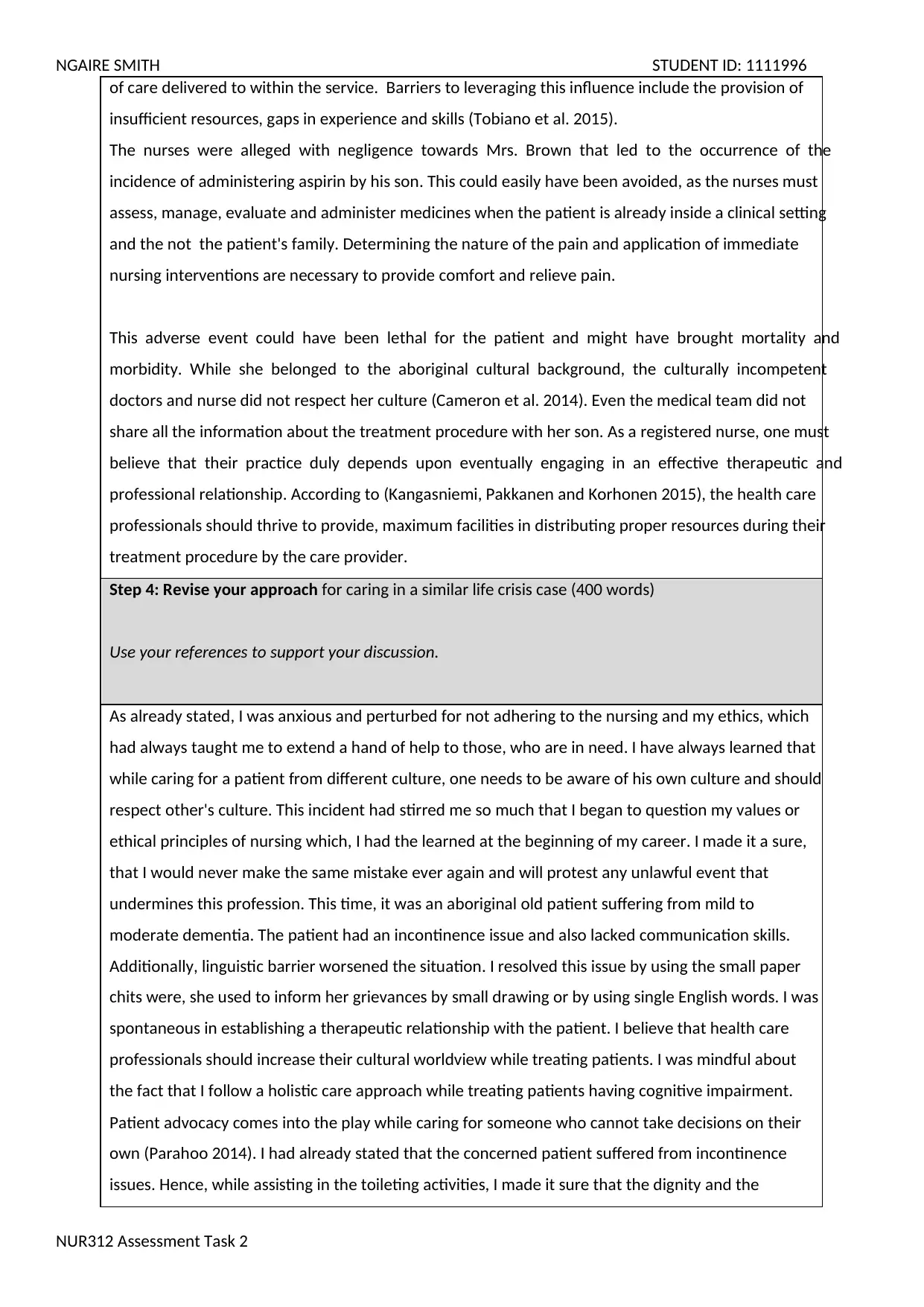
NGAIRE SMITH STUDENT ID: 1111996
NUR312 Assessment Task 2
of care delivered to within the service. Barriers to leveraging this influence include the provision of
insufficient resources, gaps in experience and skills (Tobiano et al. 2015).
The nurses were alleged with negligence towards Mrs. Brown that led to the occurrence of the
incidence of administering aspirin by his son. This could easily have been avoided, as the nurses must
assess, manage, evaluate and administer medicines when the patient is already inside a clinical setting
and the not the patient's family. Determining the nature of the pain and application of immediate
nursing interventions are necessary to provide comfort and relieve pain.
This adverse event could have been lethal for the patient and might have brought mortality and
morbidity. While she belonged to the aboriginal cultural background, the culturally incompetent
doctors and nurse did not respect her culture (Cameron et al. 2014). Even the medical team did not
share all the information about the treatment procedure with her son. As a registered nurse, one must
believe that their practice duly depends upon eventually engaging in an effective therapeutic and
professional relationship. According to (Kangasniemi, Pakkanen and Korhonen 2015), the health care
professionals should thrive to provide, maximum facilities in distributing proper resources during their
treatment procedure by the care provider.
Step 4: Revise your approach for caring in a similar life crisis case (400 words)
Use your references to support your discussion.
As already stated, I was anxious and perturbed for not adhering to the nursing and my ethics, which
had always taught me to extend a hand of help to those, who are in need. I have always learned that
while caring for a patient from different culture, one needs to be aware of his own culture and should
respect other's culture. This incident had stirred me so much that I began to question my values or
ethical principles of nursing which, I had the learned at the beginning of my career. I made it a sure,
that I would never make the same mistake ever again and will protest any unlawful event that
undermines this profession. This time, it was an aboriginal old patient suffering from mild to
moderate dementia. The patient had an incontinence issue and also lacked communication skills.
Additionally, linguistic barrier worsened the situation. I resolved this issue by using the small paper
chits were, she used to inform her grievances by small drawing or by using single English words. I was
spontaneous in establishing a therapeutic relationship with the patient. I believe that health care
professionals should increase their cultural worldview while treating patients. I was mindful about
the fact that I follow a holistic care approach while treating patients having cognitive impairment.
Patient advocacy comes into the play while caring for someone who cannot take decisions on their
own (Parahoo 2014). I had already stated that the concerned patient suffered from incontinence
issues. Hence, while assisting in the toileting activities, I made it sure that the dignity and the
NUR312 Assessment Task 2
of care delivered to within the service. Barriers to leveraging this influence include the provision of
insufficient resources, gaps in experience and skills (Tobiano et al. 2015).
The nurses were alleged with negligence towards Mrs. Brown that led to the occurrence of the
incidence of administering aspirin by his son. This could easily have been avoided, as the nurses must
assess, manage, evaluate and administer medicines when the patient is already inside a clinical setting
and the not the patient's family. Determining the nature of the pain and application of immediate
nursing interventions are necessary to provide comfort and relieve pain.
This adverse event could have been lethal for the patient and might have brought mortality and
morbidity. While she belonged to the aboriginal cultural background, the culturally incompetent
doctors and nurse did not respect her culture (Cameron et al. 2014). Even the medical team did not
share all the information about the treatment procedure with her son. As a registered nurse, one must
believe that their practice duly depends upon eventually engaging in an effective therapeutic and
professional relationship. According to (Kangasniemi, Pakkanen and Korhonen 2015), the health care
professionals should thrive to provide, maximum facilities in distributing proper resources during their
treatment procedure by the care provider.
Step 4: Revise your approach for caring in a similar life crisis case (400 words)
Use your references to support your discussion.
As already stated, I was anxious and perturbed for not adhering to the nursing and my ethics, which
had always taught me to extend a hand of help to those, who are in need. I have always learned that
while caring for a patient from different culture, one needs to be aware of his own culture and should
respect other's culture. This incident had stirred me so much that I began to question my values or
ethical principles of nursing which, I had the learned at the beginning of my career. I made it a sure,
that I would never make the same mistake ever again and will protest any unlawful event that
undermines this profession. This time, it was an aboriginal old patient suffering from mild to
moderate dementia. The patient had an incontinence issue and also lacked communication skills.
Additionally, linguistic barrier worsened the situation. I resolved this issue by using the small paper
chits were, she used to inform her grievances by small drawing or by using single English words. I was
spontaneous in establishing a therapeutic relationship with the patient. I believe that health care
professionals should increase their cultural worldview while treating patients. I was mindful about
the fact that I follow a holistic care approach while treating patients having cognitive impairment.
Patient advocacy comes into the play while caring for someone who cannot take decisions on their
own (Parahoo 2014). I had already stated that the concerned patient suffered from incontinence
issues. Hence, while assisting in the toileting activities, I made it sure that the dignity and the
Paraphrase This Document
Need a fresh take? Get an instant paraphrase of this document with our AI Paraphraser
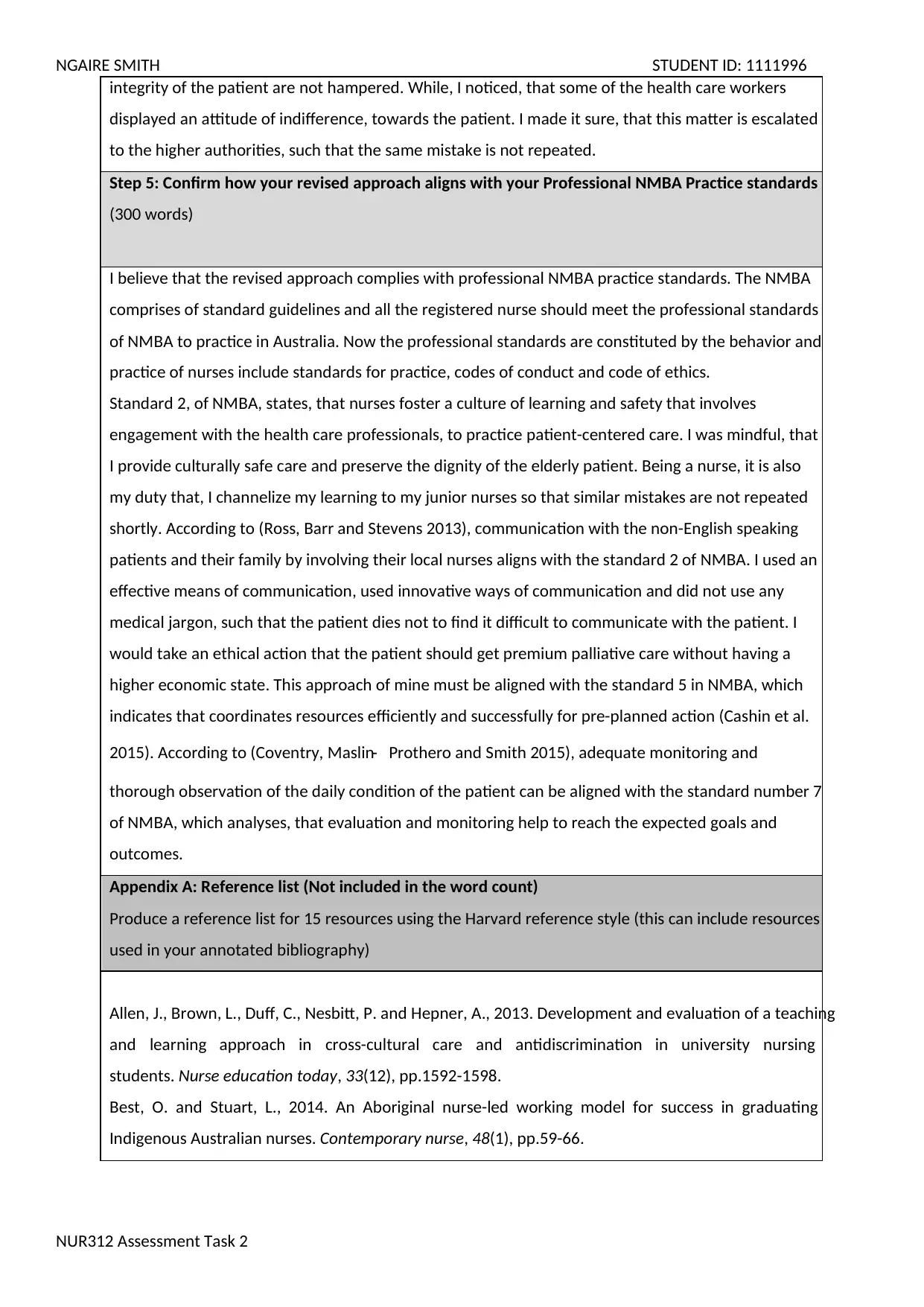
NGAIRE SMITH STUDENT ID: 1111996
NUR312 Assessment Task 2
integrity of the patient are not hampered. While, I noticed, that some of the health care workers
displayed an attitude of indifference, towards the patient. I made it sure, that this matter is escalated
to the higher authorities, such that the same mistake is not repeated.
Step 5: Confirm how your revised approach aligns with your Professional NMBA Practice standards
(300 words)
I believe that the revised approach complies with professional NMBA practice standards. The NMBA
comprises of standard guidelines and all the registered nurse should meet the professional standards
of NMBA to practice in Australia. Now the professional standards are constituted by the behavior and
practice of nurses include standards for practice, codes of conduct and code of ethics.
Standard 2, of NMBA, states, that nurses foster a culture of learning and safety that involves
engagement with the health care professionals, to practice patient-centered care. I was mindful, that
I provide culturally safe care and preserve the dignity of the elderly patient. Being a nurse, it is also
my duty that, I channelize my learning to my junior nurses so that similar mistakes are not repeated
shortly. According to (Ross, Barr and Stevens 2013), communication with the non-English speaking
patients and their family by involving their local nurses aligns with the standard 2 of NMBA. I used an
effective means of communication, used innovative ways of communication and did not use any
medical jargon, such that the patient dies not to find it difficult to communicate with the patient. I
would take an ethical action that the patient should get premium palliative care without having a
higher economic state. This approach of mine must be aligned with the standard 5 in NMBA, which
indicates that coordinates resources efficiently and successfully for pre-planned action (Cashin et al.
2015). According to (Coventry, Maslin‐ Prothero and Smith 2015), adequate monitoring and
thorough observation of the daily condition of the patient can be aligned with the standard number 7
of NMBA, which analyses, that evaluation and monitoring help to reach the expected goals and
outcomes.
Appendix A: Reference list (Not included in the word count)
Produce a reference list for 15 resources using the Harvard reference style (this can include resources
used in your annotated bibliography)
Allen, J., Brown, L., Duff, C., Nesbitt, P. and Hepner, A., 2013. Development and evaluation of a teaching
and learning approach in cross-cultural care and antidiscrimination in university nursing
students. Nurse education today, 33(12), pp.1592-1598.
Best, O. and Stuart, L., 2014. An Aboriginal nurse-led working model for success in graduating
Indigenous Australian nurses. Contemporary nurse, 48(1), pp.59-66.
NUR312 Assessment Task 2
integrity of the patient are not hampered. While, I noticed, that some of the health care workers
displayed an attitude of indifference, towards the patient. I made it sure, that this matter is escalated
to the higher authorities, such that the same mistake is not repeated.
Step 5: Confirm how your revised approach aligns with your Professional NMBA Practice standards
(300 words)
I believe that the revised approach complies with professional NMBA practice standards. The NMBA
comprises of standard guidelines and all the registered nurse should meet the professional standards
of NMBA to practice in Australia. Now the professional standards are constituted by the behavior and
practice of nurses include standards for practice, codes of conduct and code of ethics.
Standard 2, of NMBA, states, that nurses foster a culture of learning and safety that involves
engagement with the health care professionals, to practice patient-centered care. I was mindful, that
I provide culturally safe care and preserve the dignity of the elderly patient. Being a nurse, it is also
my duty that, I channelize my learning to my junior nurses so that similar mistakes are not repeated
shortly. According to (Ross, Barr and Stevens 2013), communication with the non-English speaking
patients and their family by involving their local nurses aligns with the standard 2 of NMBA. I used an
effective means of communication, used innovative ways of communication and did not use any
medical jargon, such that the patient dies not to find it difficult to communicate with the patient. I
would take an ethical action that the patient should get premium palliative care without having a
higher economic state. This approach of mine must be aligned with the standard 5 in NMBA, which
indicates that coordinates resources efficiently and successfully for pre-planned action (Cashin et al.
2015). According to (Coventry, Maslin‐ Prothero and Smith 2015), adequate monitoring and
thorough observation of the daily condition of the patient can be aligned with the standard number 7
of NMBA, which analyses, that evaluation and monitoring help to reach the expected goals and
outcomes.
Appendix A: Reference list (Not included in the word count)
Produce a reference list for 15 resources using the Harvard reference style (this can include resources
used in your annotated bibliography)
Allen, J., Brown, L., Duff, C., Nesbitt, P. and Hepner, A., 2013. Development and evaluation of a teaching
and learning approach in cross-cultural care and antidiscrimination in university nursing
students. Nurse education today, 33(12), pp.1592-1598.
Best, O. and Stuart, L., 2014. An Aboriginal nurse-led working model for success in graduating
Indigenous Australian nurses. Contemporary nurse, 48(1), pp.59-66.
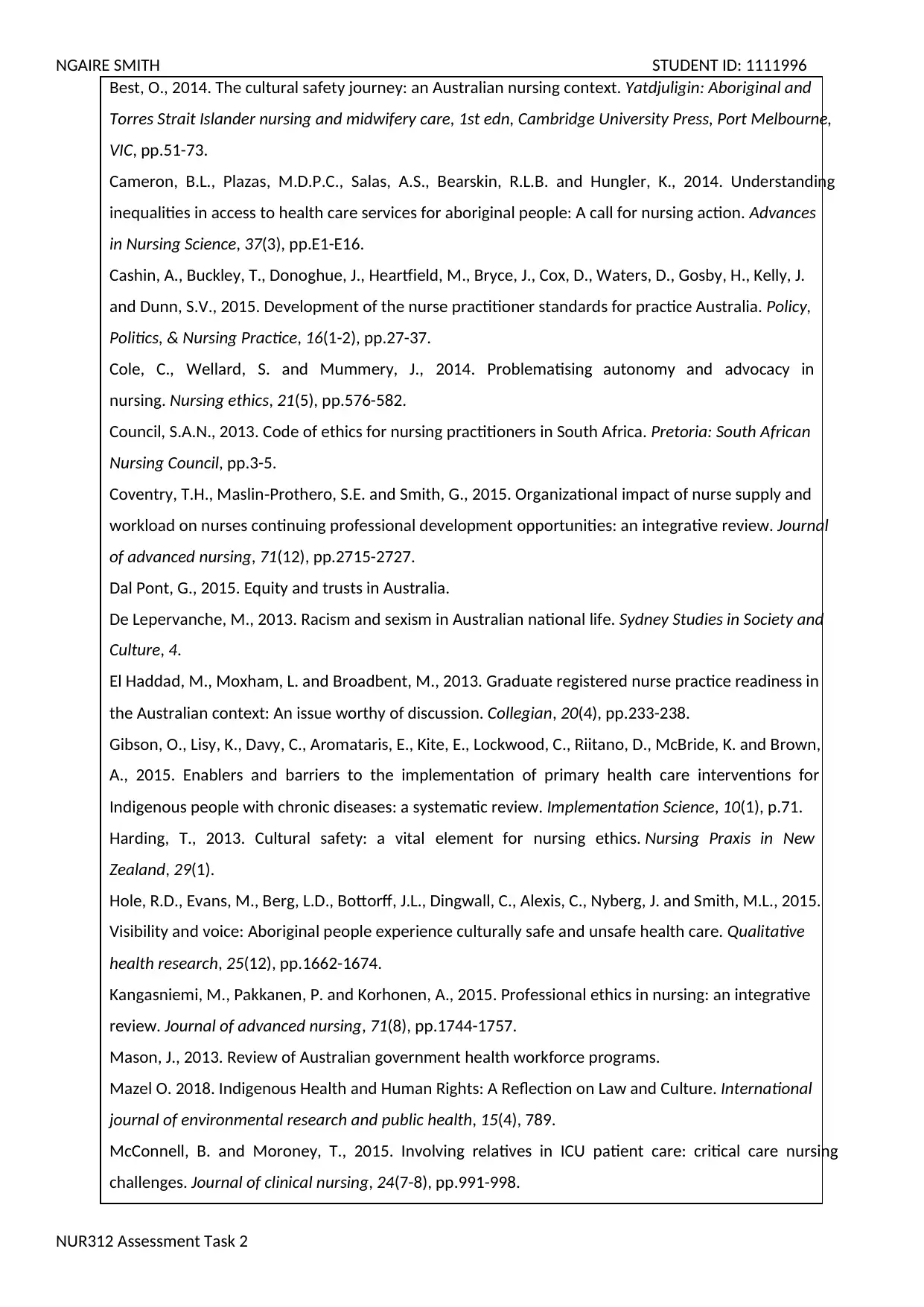
NGAIRE SMITH STUDENT ID: 1111996
NUR312 Assessment Task 2
Best, O., 2014. The cultural safety journey: an Australian nursing context. Yatdjuligin: Aboriginal and
Torres Strait Islander nursing and midwifery care, 1st edn, Cambridge University Press, Port Melbourne,
VIC, pp.51-73.
Cameron, B.L., Plazas, M.D.P.C., Salas, A.S., Bearskin, R.L.B. and Hungler, K., 2014. Understanding
inequalities in access to health care services for aboriginal people: A call for nursing action. Advances
in Nursing Science, 37(3), pp.E1-E16.
Cashin, A., Buckley, T., Donoghue, J., Heartfield, M., Bryce, J., Cox, D., Waters, D., Gosby, H., Kelly, J.
and Dunn, S.V., 2015. Development of the nurse practitioner standards for practice Australia. Policy,
Politics, & Nursing Practice, 16(1-2), pp.27-37.
Cole, C., Wellard, S. and Mummery, J., 2014. Problematising autonomy and advocacy in
nursing. Nursing ethics, 21(5), pp.576-582.
Council, S.A.N., 2013. Code of ethics for nursing practitioners in South Africa. Pretoria: South African
Nursing Council, pp.3-5.
Coventry, T.H., Maslin‐Prothero, S.E. and Smith, G., 2015. Organizational impact of nurse supply and
workload on nurses continuing professional development opportunities: an integrative review. Journal
of advanced nursing, 71(12), pp.2715-2727.
Dal Pont, G., 2015. Equity and trusts in Australia.
De Lepervanche, M., 2013. Racism and sexism in Australian national life. Sydney Studies in Society and
Culture, 4.
El Haddad, M., Moxham, L. and Broadbent, M., 2013. Graduate registered nurse practice readiness in
the Australian context: An issue worthy of discussion. Collegian, 20(4), pp.233-238.
Gibson, O., Lisy, K., Davy, C., Aromataris, E., Kite, E., Lockwood, C., Riitano, D., McBride, K. and Brown,
A., 2015. Enablers and barriers to the implementation of primary health care interventions for
Indigenous people with chronic diseases: a systematic review. Implementation Science, 10(1), p.71.
Harding, T., 2013. Cultural safety: a vital element for nursing ethics. Nursing Praxis in New
Zealand, 29(1).
Hole, R.D., Evans, M., Berg, L.D., Bottorff, J.L., Dingwall, C., Alexis, C., Nyberg, J. and Smith, M.L., 2015.
Visibility and voice: Aboriginal people experience culturally safe and unsafe health care. Qualitative
health research, 25(12), pp.1662-1674.
Kangasniemi, M., Pakkanen, P. and Korhonen, A., 2015. Professional ethics in nursing: an integrative
review. Journal of advanced nursing, 71(8), pp.1744-1757.
Mason, J., 2013. Review of Australian government health workforce programs.
Mazel O. 2018. Indigenous Health and Human Rights: A Reflection on Law and Culture. International
journal of environmental research and public health, 15(4), 789.
McConnell, B. and Moroney, T., 2015. Involving relatives in ICU patient care: critical care nursing
challenges. Journal of clinical nursing, 24(7-8), pp.991-998.
NUR312 Assessment Task 2
Best, O., 2014. The cultural safety journey: an Australian nursing context. Yatdjuligin: Aboriginal and
Torres Strait Islander nursing and midwifery care, 1st edn, Cambridge University Press, Port Melbourne,
VIC, pp.51-73.
Cameron, B.L., Plazas, M.D.P.C., Salas, A.S., Bearskin, R.L.B. and Hungler, K., 2014. Understanding
inequalities in access to health care services for aboriginal people: A call for nursing action. Advances
in Nursing Science, 37(3), pp.E1-E16.
Cashin, A., Buckley, T., Donoghue, J., Heartfield, M., Bryce, J., Cox, D., Waters, D., Gosby, H., Kelly, J.
and Dunn, S.V., 2015. Development of the nurse practitioner standards for practice Australia. Policy,
Politics, & Nursing Practice, 16(1-2), pp.27-37.
Cole, C., Wellard, S. and Mummery, J., 2014. Problematising autonomy and advocacy in
nursing. Nursing ethics, 21(5), pp.576-582.
Council, S.A.N., 2013. Code of ethics for nursing practitioners in South Africa. Pretoria: South African
Nursing Council, pp.3-5.
Coventry, T.H., Maslin‐Prothero, S.E. and Smith, G., 2015. Organizational impact of nurse supply and
workload on nurses continuing professional development opportunities: an integrative review. Journal
of advanced nursing, 71(12), pp.2715-2727.
Dal Pont, G., 2015. Equity and trusts in Australia.
De Lepervanche, M., 2013. Racism and sexism in Australian national life. Sydney Studies in Society and
Culture, 4.
El Haddad, M., Moxham, L. and Broadbent, M., 2013. Graduate registered nurse practice readiness in
the Australian context: An issue worthy of discussion. Collegian, 20(4), pp.233-238.
Gibson, O., Lisy, K., Davy, C., Aromataris, E., Kite, E., Lockwood, C., Riitano, D., McBride, K. and Brown,
A., 2015. Enablers and barriers to the implementation of primary health care interventions for
Indigenous people with chronic diseases: a systematic review. Implementation Science, 10(1), p.71.
Harding, T., 2013. Cultural safety: a vital element for nursing ethics. Nursing Praxis in New
Zealand, 29(1).
Hole, R.D., Evans, M., Berg, L.D., Bottorff, J.L., Dingwall, C., Alexis, C., Nyberg, J. and Smith, M.L., 2015.
Visibility and voice: Aboriginal people experience culturally safe and unsafe health care. Qualitative
health research, 25(12), pp.1662-1674.
Kangasniemi, M., Pakkanen, P. and Korhonen, A., 2015. Professional ethics in nursing: an integrative
review. Journal of advanced nursing, 71(8), pp.1744-1757.
Mason, J., 2013. Review of Australian government health workforce programs.
Mazel O. 2018. Indigenous Health and Human Rights: A Reflection on Law and Culture. International
journal of environmental research and public health, 15(4), 789.
McConnell, B. and Moroney, T., 2015. Involving relatives in ICU patient care: critical care nursing
challenges. Journal of clinical nursing, 24(7-8), pp.991-998.
⊘ This is a preview!⊘
Do you want full access?
Subscribe today to unlock all pages.

Trusted by 1+ million students worldwide
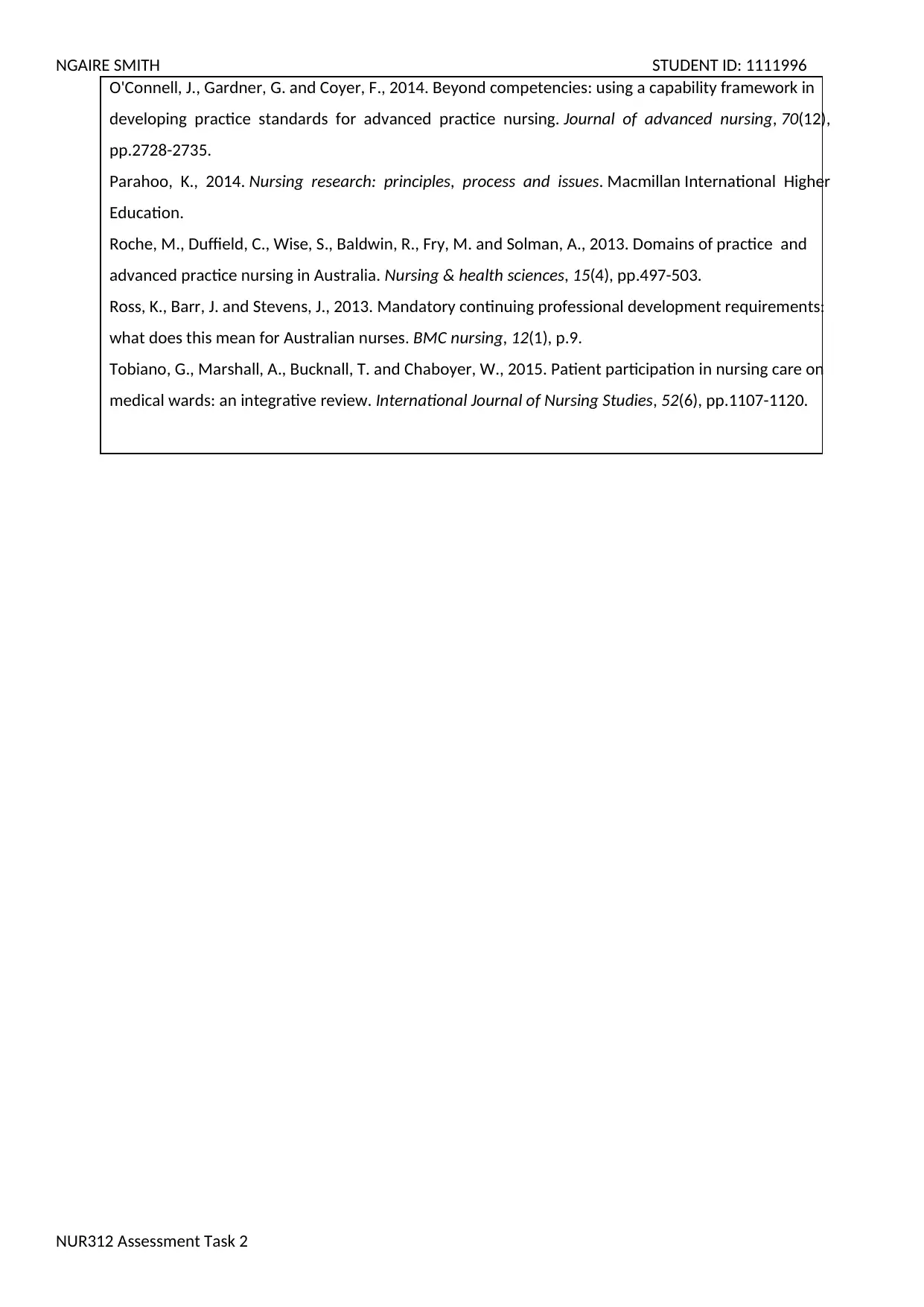
NGAIRE SMITH STUDENT ID: 1111996
NUR312 Assessment Task 2
O'Connell, J., Gardner, G. and Coyer, F., 2014. Beyond competencies: using a capability framework in
developing practice standards for advanced practice nursing. Journal of advanced nursing, 70(12),
pp.2728-2735.
Parahoo, K., 2014. Nursing research: principles, process and issues. Macmillan International Higher
Education.
Roche, M., Duffield, C., Wise, S., Baldwin, R., Fry, M. and Solman, A., 2013. Domains of practice and
advanced practice nursing in Australia. Nursing & health sciences, 15(4), pp.497-503.
Ross, K., Barr, J. and Stevens, J., 2013. Mandatory continuing professional development requirements:
what does this mean for Australian nurses. BMC nursing, 12(1), p.9.
Tobiano, G., Marshall, A., Bucknall, T. and Chaboyer, W., 2015. Patient participation in nursing care on
medical wards: an integrative review. International Journal of Nursing Studies, 52(6), pp.1107-1120.
NUR312 Assessment Task 2
O'Connell, J., Gardner, G. and Coyer, F., 2014. Beyond competencies: using a capability framework in
developing practice standards for advanced practice nursing. Journal of advanced nursing, 70(12),
pp.2728-2735.
Parahoo, K., 2014. Nursing research: principles, process and issues. Macmillan International Higher
Education.
Roche, M., Duffield, C., Wise, S., Baldwin, R., Fry, M. and Solman, A., 2013. Domains of practice and
advanced practice nursing in Australia. Nursing & health sciences, 15(4), pp.497-503.
Ross, K., Barr, J. and Stevens, J., 2013. Mandatory continuing professional development requirements:
what does this mean for Australian nurses. BMC nursing, 12(1), p.9.
Tobiano, G., Marshall, A., Bucknall, T. and Chaboyer, W., 2015. Patient participation in nursing care on
medical wards: an integrative review. International Journal of Nursing Studies, 52(6), pp.1107-1120.
1 out of 7
Related Documents
Your All-in-One AI-Powered Toolkit for Academic Success.
+13062052269
info@desklib.com
Available 24*7 on WhatsApp / Email
![[object Object]](/_next/static/media/star-bottom.7253800d.svg)
Unlock your academic potential
Copyright © 2020–2026 A2Z Services. All Rights Reserved. Developed and managed by ZUCOL.





